The Lateral Dialogues
The Lateral Dialogues aspire to bring different perspectives on organizational and leadership dynamics. Every episode explores a relevant topic to those leading being part of or consulting to organizations and aspires to challenge our existing and mainstream thinking further. We debate each topic, bring relevant research, share personal stories and work cases. Ultimately, inspiring you to look at your own dynamics in the workplace and your everyday social life with a fresh view!
The Lateral Dialogues aspire to bring different perspectives on organizational and leadership dynamics. Every episode explores a relevant topic to those leading being part of or consulting to organizations and aspires to challenge our existing and mainstream thinking further. We debate each topic, bring relevant research, share personal stories and work cases. Ultimately, inspiring you to look at your own dynamics in the workplace and your everyday social life with a fresh view!
Episodes

Monday Sep 01, 2025
Monday Sep 01, 2025
Ever sat in a functional team meeting thinking, “Why do we keep talking like this?” What if those awkward conversations and recurring patterns weren’t just quirks—but clues? Clues to the strategic tensions, the complexity of business partnering, and the invisible forces shaping how team members show up.
In this podcast, Petros Oratis and Warden Hoffman—seasoned insiders, researchers, and consultants to functional teams—bring humor and heart to a revealing exploration of functional team dynamics. They introduce six vivid "archetypes" that show up again and again in functional teams across industries:
🏆 Best Business Contest – Competitive energy disguised as collaboration
😢 Detox Retreat – Emotional processing without resolution
⚔️ Holy Warriors – Mission-driven clashes over values
📣 Grievance Union – Collective venting with no clear path forward
🐝 Show-Off Beehive – Buzzing brilliance with little cohesion
🍰 High-Tea Gathering – Polite avoidance of deeper tensions
These aren’t dysfunctions to fix—they’re reflections of a team’s values and strengths that, in the moment, may be in conflict or struggling to surface. By recognizing these patterns, we can shift the team’s awareness and spark the right conversations that meet its true needs.
What if in the moment we could shift the team's consciousness and hold the right dialogue that addresses the actual needs of the team?
💡 What dynamics have you seen in your own team? Tune in, reflect, and join the dialogue.
The Lateral Space website: http://www.thelateralspace.com
Petros Oratis bio: https://www.linkedin.com/in/petrosoratis/
Warden Hoffman bio: https://www.linkedin.com/in/warden-hoffman-72b5801/
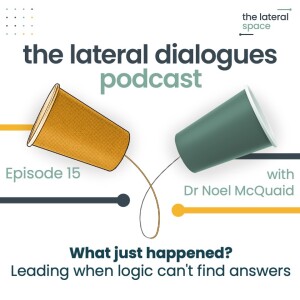
Saturday Apr 05, 2025
15. What just happened? Leading when logic can't find answers (with Dr Noel McQuaid)
Saturday Apr 05, 2025
Saturday Apr 05, 2025
"What just happened? Was this a coincidence or a sign from somewhere?" What happens to us, when experiencing something that prompt such questions in us? How do we process so-called mystical or uncanny experiences, which logic can't help navigating? And if organizations thrive on navigating challenges and dilemmas through logic and facts, could suspending fact-based thinking result into effective leadership?
Dr Noel McQuaid fascinated by these aspects of life, researched how senior leaders navigate experiences that their logic couldn't explain. He found that suspending logical thinking and not dismissing too early such experiences could actually result into effective and courageous decision-making, which otherwise wouldn't be possible or at as accessible. He shares his fascinating insights and ideas on a topic that we may rarely think of or make space for.
Dr Noel McQuaid bio: https://www.linkedin.com/in/dr-noel-mcquaid-180749112/
The Lateral Space: https://www.thelateralspace.com/
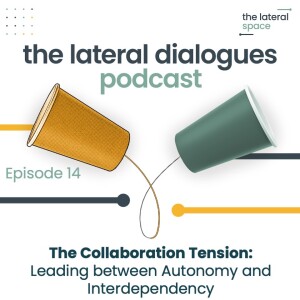
Thursday Feb 27, 2025
14. The Collaboration Tension: Leading between Autonomy and Interdependency
Thursday Feb 27, 2025
Thursday Feb 27, 2025
What does it take to collaborating in today's organizational complexity? There are two major shifts, which are the two sides of the same coin: 1. our interdependencies are heightened more than ever, and 2. we are expected to operate with autonomy, to be self-steering.
This mean that to be an effective leader today you need to actively manage your ability to operate autonomously AND to thrive through the interdependencies with other leaders. Easier said than done!
In this podcast episode Warden Hoffman and Petros Oratis explore the tension that most leaders and teams experience in this paradigm:
Autonomy vs. Interdependency: we uncover the intriguing paradox of balancing your personal drive with the power of teamwork
Psychological Dimensions: we explore the psychological orientation towards dependency and autonomy, by delving into how our early experiences shape our views on working independently and collaboratively
Avoidance Routines: we bring language that helps spotting the sneaky team habits that can sabotage interdependent efforts and learn how to tackle them
Practical Steps: we demystify some principles of collaboration in ways that allow us to set clear collaborative tasks, having open conversations about the cost of collaboration, and manage the conflicts between individual and collective ambitions
The Lateral Dialgoues podcast: The Lateral Dialogues | a podcast by The Lateral Space
The Lateral Space website: The Lateral Space
Warden Hoffman bio: https://www.linkedin.com/in/warden-hoffman-72b5801/
Petros Oratis bio: https://www.linkedin.com/in/petrosoratis/
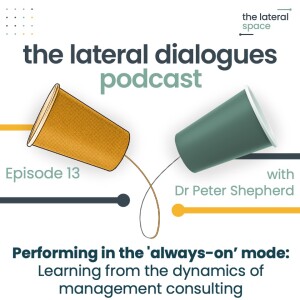
Monday Jan 06, 2025
Monday Jan 06, 2025
How does it feel to work in highly pressurized organizations, on the "always-on" mode?
How do performance-driven organizations deal with uncertainty, lack of progress, and not-knowing?
How do ambitious people deal with their performance in these organizations?
What are the dynamics developed between individuals and leaders?
In this episode we explore some of the implications of working in highly pressurized, performance-driven organizations, by learning from the dynamics of management consulting firms.
Whilst a performance-focused culture is an imperative for the success and survival of an organization, if certain conditions aren't in place it can have adverse effects in results, organizational health, adaptability and individual wellbeing.
To understand all these deeper, we hosted Dr Peter Shepherd, who researched management consulting firms through anthropology, and unraveled for us a fascinating description of all that happens within these cultures. In this dialogue we explored some reasons behind certain dynamics and what are some conditions that allow a performance culture to be sustainable and thriving, rather than detrimental for an organization and its individuals.
Dr Peter Shepherd bio: https://www.linkedin.com/in/dr-peter-shepherd-fcipd-898955/
The Lateral Space website: https://www.thelateralspace.com/
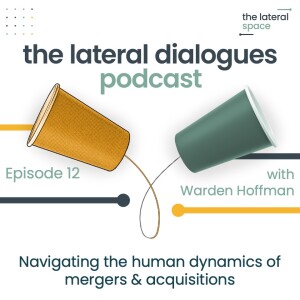
Friday Nov 29, 2024
Friday Nov 29, 2024
Why are human dynamics of mergers and acquisitions so challenging?
In this episode Warden Hoffman outlines his observations, findings and ways of working when it comes to organizations and teams that merge. Warden developed this curiosity early in his career and after being exposed to M&A in many of his roles he found himself consulting to numerous organizations and teams post-merger.
We explore a series of questions:
What are the human forces that slow down the creation of a new entity post-merger?
Why former organizational identities matter so much?
Why are mergers prone to create competitive dynamics, even when that's not needed and what are the competing for?
What are some practical ways of addressing these very challenging dynamics, when planning a merger or leading merged teams?
Warden Hoffman bio: https://www.linkedin.com/in/warden-hoffman-72b5801/
the lateral space website: http://www.thelateralspace.com
the lateral dialogues podcast: https://thelateraldialogues.podbean.com/

Friday Oct 18, 2024
Friday Oct 18, 2024
A major shift in how we look at teams is to not only look at individuals and how they create a group but to see the group as one entity, the team as a whole. Do teams have a secret life of their own?
This different perspective on teams as being one entity, creates a novel perspective on group dynamics and offers the opportunity to work with teams differently.
In this episode, we explore the tension between our tendency to focus on the individual while being part of a team system. How does this affect the people part of the team, what are typical team behaviors we can distinguish and how does it impact the way a team learns and develops?
Our guest is Dr Martin Lüdemann, who has worked as a psychologist and supervisor for 30 years, consulting, supporting, and guiding groups and individuals in organizations. Martin recently completed the Professional Doctorate at the Tavistock Clinic, where he researched group-as-a-whole phenomena.
Dr Martin Lüdemann profile: https://www.linkedin.com/in/dr-martin-luedemann-05375277/
The Lateral Space: https://www.thelateralspace.com/
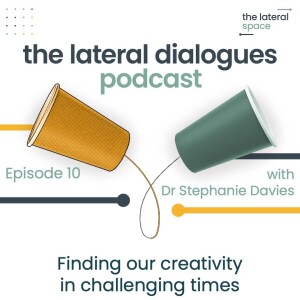
Tuesday Sep 10, 2024
10. Finding our creativity in challenging times (with Dr Stephanie Davies)
Tuesday Sep 10, 2024
Tuesday Sep 10, 2024
How can we connect with our creativity when we are challenged? Creativity is more than artistic expression. It starts from conceiving a new thought, allowing it to emerge, socializing it and converting it into action. Often times what emerges through creativity goes against the current stream, which is exactly what's needed to get us out of unknown challenging situations. So how do we enable this to happen? How can we allow creativity under pressure?
This dialogue features Stephanie Davies an organizational development and change consultant who is specialized in creativity. Stephanie researched the lives of very creative people to understand how creativity functions and with that knowledge understand where we can locate creativity in organizations and our leadership.
Dr Stephanie Davies profile: https://www.linkedin.com/in/dr-stephanie-davies-70ab48136/
The Lateral Space website: http://www.thelateralspace.com
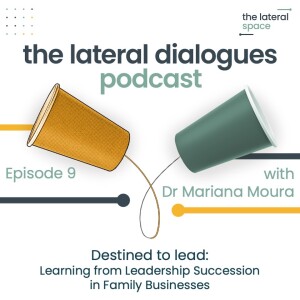
Friday Jul 19, 2024
Friday Jul 19, 2024
How does it feel knowing that you might be the next leader in line? How does being destined to lead impact your identity? How do you build credibility and enable your authenticity? Will you always be compared to the previous generation? Can succession in family businesses be meritocratic? And is the right way for the next leader to emerge amongst siblings or peers?
In this episode, we explore the fascinating dynamics of leadership succession in family businesses. We may find that these invaluable lessons are applicable to the abiding challenges of succession in any type of organization, and especially those struggling to replace their current strong and successful leaders.
We are joined by Dr Mariana Moura, consultant to family businesses, board member of a family business, who completed her doctoral research on next-generation leadership in family businesses and author of the book "Supergovernance: A Broad Look at the Challenges of Family Businesses".
Mariana Moura bio: https://www.linkedin.com/in/mariana-moura-2318217a/
Research thesis: https://repository.tavistockandportman.ac.uk/2862/
The Lateral Space: https://www.thelateralspace.com/
Follow us on LinkedIn: https://www.linkedin.com/company/14652748
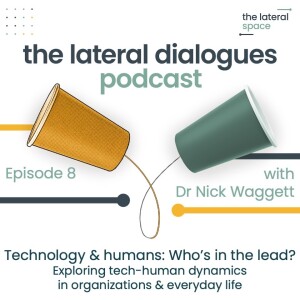
Friday Jun 14, 2024
Friday Jun 14, 2024
Throughout human history we have been developing and deploying technological solutions in the service of organizational and human needs. But after technology gets introduced, we may quickly find ourselves operating in the service of the needs of technology more than our own. Our tendency to idealize its possibilities and benefits, may quickly make us give up authority to technology to lead us, and lose our capacity to think as every situation requires us to. We adjust our lifestyles or work processes to serve the tech interface, sometimes forgetting that it should serve us. Why do we do that? And how could we approach technology, so that we benefit from it and effectively manage its consequences?
We are joined by Dr Nick Waggett who has been extensively studying the dynamics of organizations through a systems-psychodynamics and socio-technical systems perspective and particularly researched technology use in public service organizations (UK healthcare). Nick helps us explore: why do we abdicate our authority to tech systems, and how does this impact our capacity to lead? What is the management focus when implementing technology and what might get lost? In our everyday psychology, how does a tech interface become our mental image and overall filter of the world? How are current social dynamics a result of the human interactions within tech interfaces? Finally, what can we learn from our hopes and fears associated with the current AI evolution?
Dr Nick Waggett is the course leader of the Tavistock professional doctorate "Advanced practice and research: consultation and the organisation" https://tavistockandportman.ac.uk/courses/advanced-practice-and-research-consultation-and-the-organisation-d10d/
The Lateral Dialogues are hosted by Warden Hoffman and Petros Oratis, managing partners at The Lateral Space http://www.thelateralspace.com/
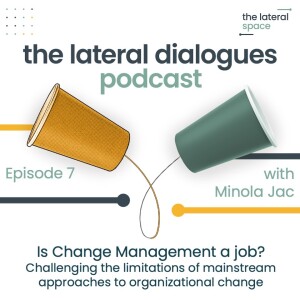
Thursday Apr 25, 2024
Thursday Apr 25, 2024
Change management has been very present in management practices with lots of well-known methodologies, primarily originating from project management environments. But do they always yield the desired benefits?
What about the non-linear aspects of organizational change? Whether that’s an adjustment to a new environment, letting go of well-known and liked ways of working or facing loss and uncertainty. How clear is the desired end-state, when we lead change and when does the change work stop?
In this episode, we discuss questions around, the position of change management in large organizations and the role of senior management. The usefulness and limitations of a process-focused change management approach. But mainly we explore the human side of change, how to deal with seemingly small experiences of human change that can have a major impact on the organization’s ability to handle change. Change as something that happens to and must be digested by people.
We are joined by our guest, Minola Jac, who describes herself as a journalist by trade and a changed practitioner by choice. We discuss not only learnings based on her extensive experience as a change practitioner in a large corporate organization, but also insights from her book “Everyday Inspiration for Change: How Daily Experiences Can Be Your Mentor for Change in Life and Work.” With her book in mind, we discuss the power of storytelling in change. https://www.amazon.com/Everyday-Inspiration-Change-Experiences-Mentor/dp/B0CGL9VMY1
The Lateral Dialogues are hosted by Warden Hoffman and Petros Oratis, consultants and managing partners at The Lateral Space http://www.thelateralspace.com/









